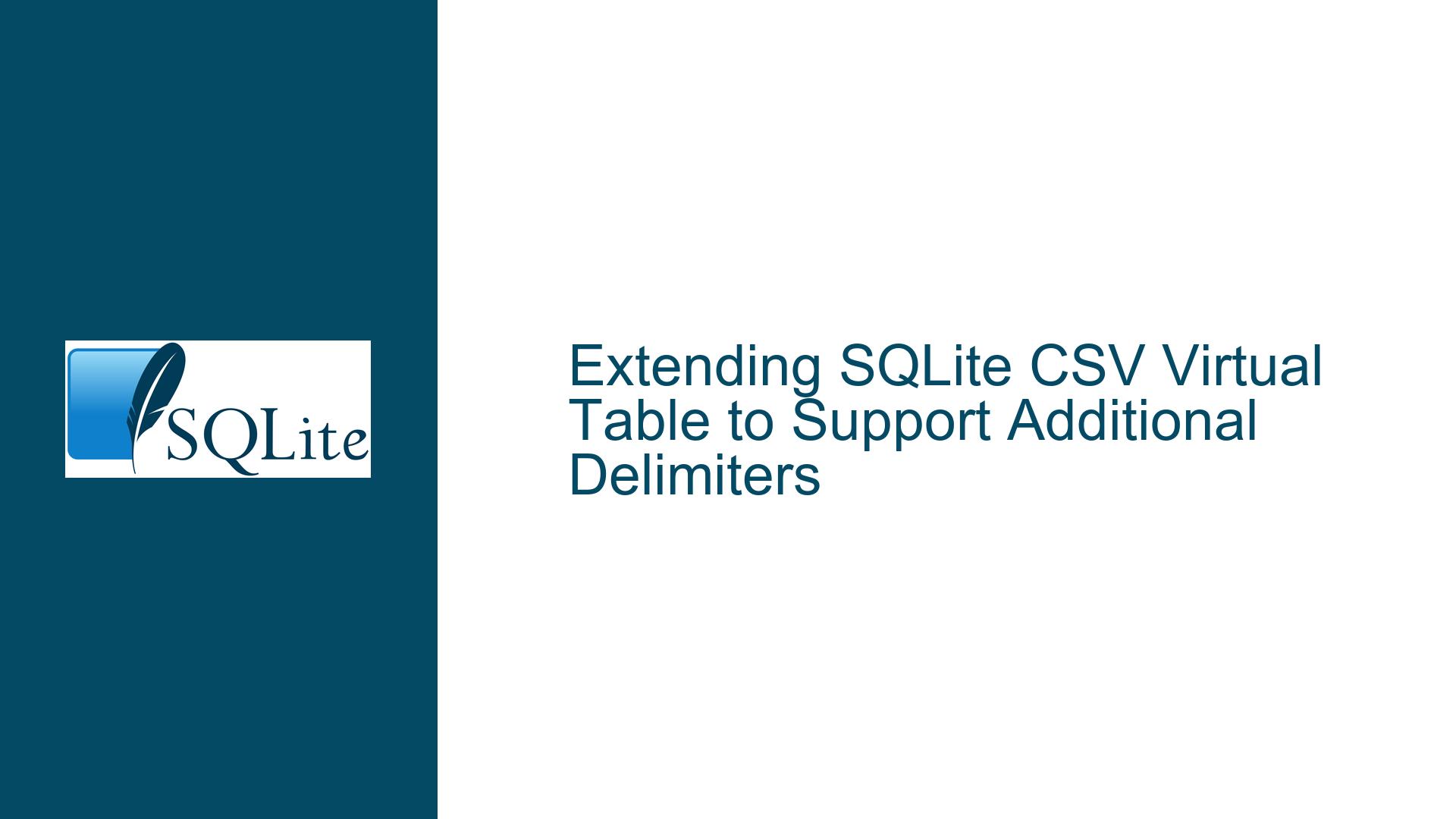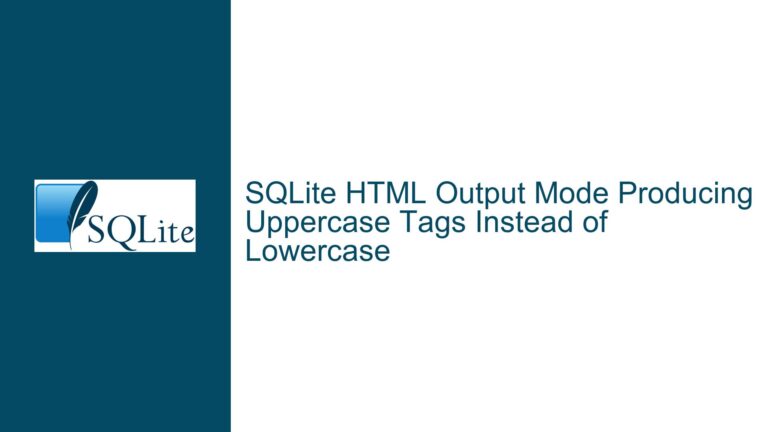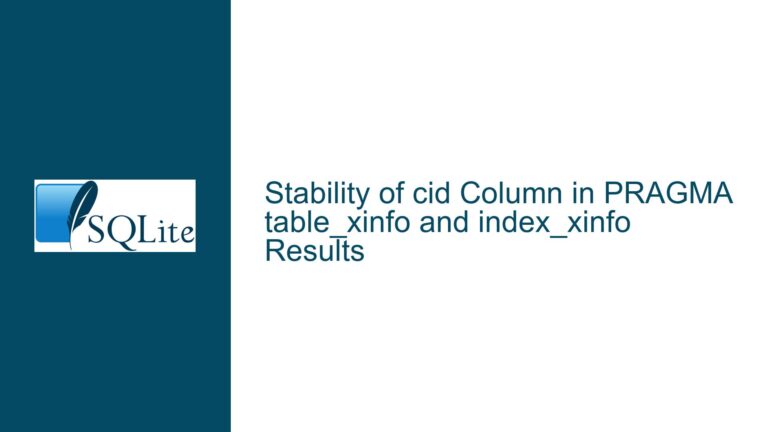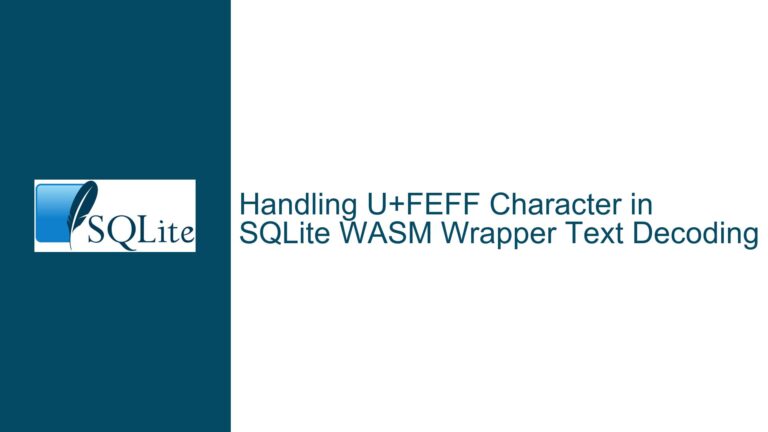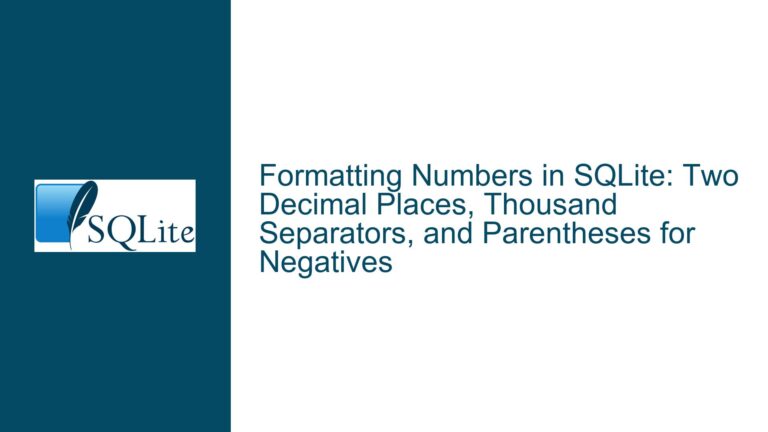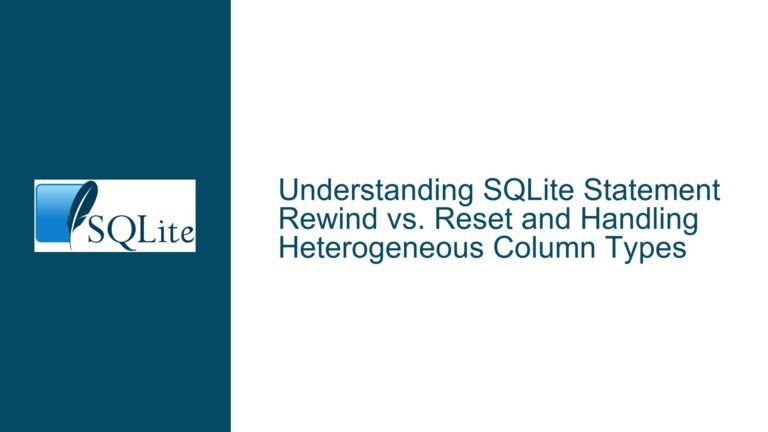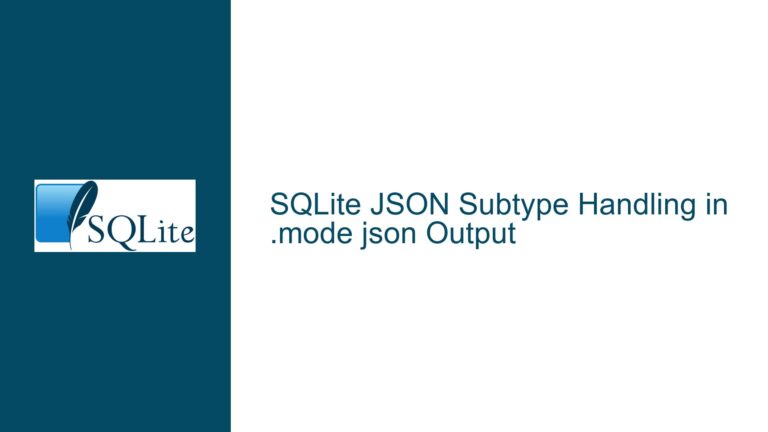Extending SQLite CSV Virtual Table to Support Additional Delimiters
Current Limitation of SQLite CSV Virtual Table Module
The SQLite CSV Virtual Table module, as it stands, is designed to handle Comma Separated Values (CSV) files exclusively. This means that the module is hardcoded to recognize only the comma (,) as the delimiter separating fields within the CSV file. While this design choice aligns with the module’s name and primary use case, it presents a significant limitation for users who need to work with files that use other delimiters, such as tabs, colons, or pipes. The current implementation does not provide a built-in mechanism to specify or change the delimiter, which restricts its flexibility and utility in scenarios where data is formatted differently.
The core of the issue lies in the module’s architecture, which assumes a fixed delimiter. This assumption is embedded in the parsing logic, making it difficult to extend without modifying the source code. The module’s design does not account for the variability in delimiter usage that is common in real-world data exchange scenarios. For instance, while CSV files traditionally use commas, other formats like TSV (Tab-Separated Values) or DSV (Delimiter-Separated Values) use different characters. The inability to handle these variations limits the module’s applicability and forces users to either preprocess their data or seek alternative solutions.
Moreover, the current implementation does not provide a straightforward way to handle edge cases, such as when the delimiter character appears within a field value. In standard CSV files, this is typically managed by enclosing the field in quotes, but the SQLite CSV Virtual Table module does not offer a flexible mechanism to define or change the quote character either. This rigidity can lead to parsing errors or data corruption when dealing with files that deviate from the expected format.
The limitation becomes particularly problematic in environments where data is sourced from multiple systems, each potentially using different delimiters. For example, a user might receive data from one system that uses tabs as delimiters and another that uses colons. Without the ability to specify the delimiter, the user would need to manually convert all files to use commas, which is both time-consuming and error-prone. This inefficiency can be a significant bottleneck in data processing workflows, especially when dealing with large datasets or automated data pipelines.
In summary, the current limitation of the SQLite CSV Virtual Table module lies in its inability to support additional delimiters beyond the comma. This restriction reduces its flexibility and makes it less suitable for handling a wide range of data formats. Addressing this limitation would require modifying the module’s parsing logic to allow for variable delimiters, which would significantly enhance its utility and make it a more versatile tool for data import and manipulation tasks.
Challenges in Implementing Variable Delimiters in CSV Parsing
Implementing variable delimiters in the SQLite CSV Virtual Table module introduces several technical challenges that must be carefully addressed to ensure robust and reliable functionality. One of the primary challenges is the need to modify the module’s parsing logic to dynamically recognize and handle different delimiter characters. This requires a fundamental change in how the module processes input data, as it must now account for the possibility of multiple delimiter types within the same parsing routine.
A significant technical hurdle is ensuring that the module can correctly identify and handle delimiters that appear within field values. In standard CSV files, fields containing the delimiter character are typically enclosed in quotes to distinguish them from actual delimiters. However, when the delimiter itself is variable, the module must be able to dynamically adjust its parsing logic to account for different quote characters or escape sequences. This adds complexity to the parsing algorithm, as it must now handle a wider range of edge cases and potential ambiguities in the input data.
Another challenge is maintaining backward compatibility with existing CSV files that use the comma as the default delimiter. Any changes to the module must ensure that it continues to work seamlessly with these files while also providing the flexibility to handle new delimiter types. This requires careful design and testing to avoid introducing regressions or breaking changes that could affect existing users.
The implementation must also consider performance implications. Parsing CSV files with variable delimiters may introduce additional overhead, particularly if the module needs to perform more complex checks or handle larger input buffers. Optimizing the parsing algorithm to minimize performance degradation while maintaining accuracy is a non-trivial task that requires thorough profiling and testing.
Furthermore, the module must provide a clear and intuitive interface for users to specify the delimiter character. This could involve extending the module’s configuration options to include a delimiter parameter, which would need to be documented and supported in a way that is consistent with the rest of the SQLite ecosystem. Ensuring that this interface is user-friendly and well-integrated with existing tools and workflows is crucial for adoption and usability.
Finally, the implementation must address potential security concerns. Allowing users to specify arbitrary delimiter characters introduces the risk of malicious input that could exploit vulnerabilities in the parsing logic. The module must include robust input validation and error handling to mitigate these risks and ensure that it can safely handle a wide range of input data without compromising the integrity of the database.
In summary, implementing variable delimiters in the SQLite CSV Virtual Table module presents several technical challenges, including modifying the parsing logic, handling edge cases, maintaining backward compatibility, optimizing performance, providing a user-friendly interface, and addressing security concerns. Successfully overcoming these challenges requires careful design, thorough testing, and a deep understanding of both the module’s internals and the broader SQLite ecosystem.
Extending SQLite CSV Virtual Table with Custom Delimiter Support
To extend the SQLite CSV Virtual Table module with custom delimiter support, a comprehensive approach is required that involves modifying the module’s source code, integrating external solutions, and ensuring robust testing and validation. The first step in this process is to modify the module’s parsing logic to allow for variable delimiters. This involves updating the code that reads and processes the input file to dynamically recognize and handle different delimiter characters based on user input.
One approach to achieving this is to introduce a new configuration parameter that allows users to specify the delimiter character when creating or attaching a CSV virtual table. This parameter would be passed to the module’s initialization routine, where it would be used to configure the parsing logic accordingly. The module would then use this parameter to identify the delimiter character in the input file and adjust its parsing behavior accordingly.
In addition to modifying the parsing logic, the module must also be updated to handle edge cases and potential ambiguities in the input data. This includes implementing support for quoted fields and escape sequences, which are commonly used to handle delimiter characters that appear within field values. The module must be able to dynamically adjust its parsing behavior based on the specified delimiter and quote characters, ensuring that it can correctly interpret the input data regardless of its format.
To facilitate this, the module could integrate existing solutions or libraries that provide robust CSV parsing capabilities. For example, the VSV.C library mentioned in the forum discussion offers a flexible and extensible approach to handling variable delimiters and could serve as a valuable reference or starting point for implementing similar functionality in the SQLite CSV Virtual Table module. By leveraging existing code and best practices, the module can reduce development time and improve overall reliability.
Once the necessary modifications have been made, the module must undergo thorough testing to ensure that it works correctly with a wide range of input data and delimiter types. This includes testing with standard CSV files, as well as files that use different delimiters, quote characters, and escape sequences. The testing process should also include performance profiling to identify and address any potential bottlenecks or inefficiencies in the parsing logic.
Finally, the extended module must be documented and integrated into the broader SQLite ecosystem. This includes updating the module’s documentation to reflect the new functionality and providing clear examples and guidelines for users. The module should also be made available as part of the official SQLite distribution, ensuring that it is easily accessible to users and supported by the SQLite development team.
In summary, extending the SQLite CSV Virtual Table module with custom delimiter support involves modifying the parsing logic, integrating external solutions, conducting thorough testing, and ensuring proper documentation and integration. By following this approach, the module can be enhanced to support a wider range of data formats, making it a more versatile and powerful tool for data import and manipulation tasks.
